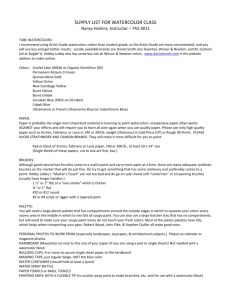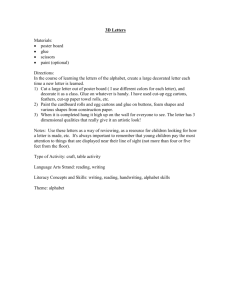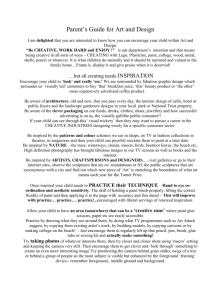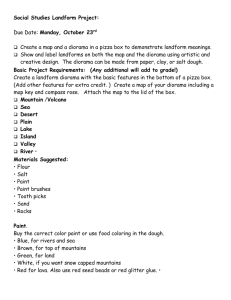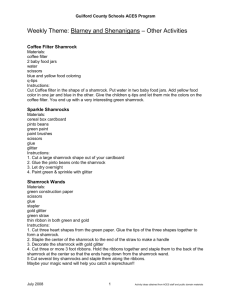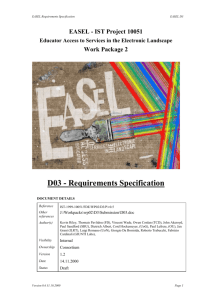Week 9
advertisement
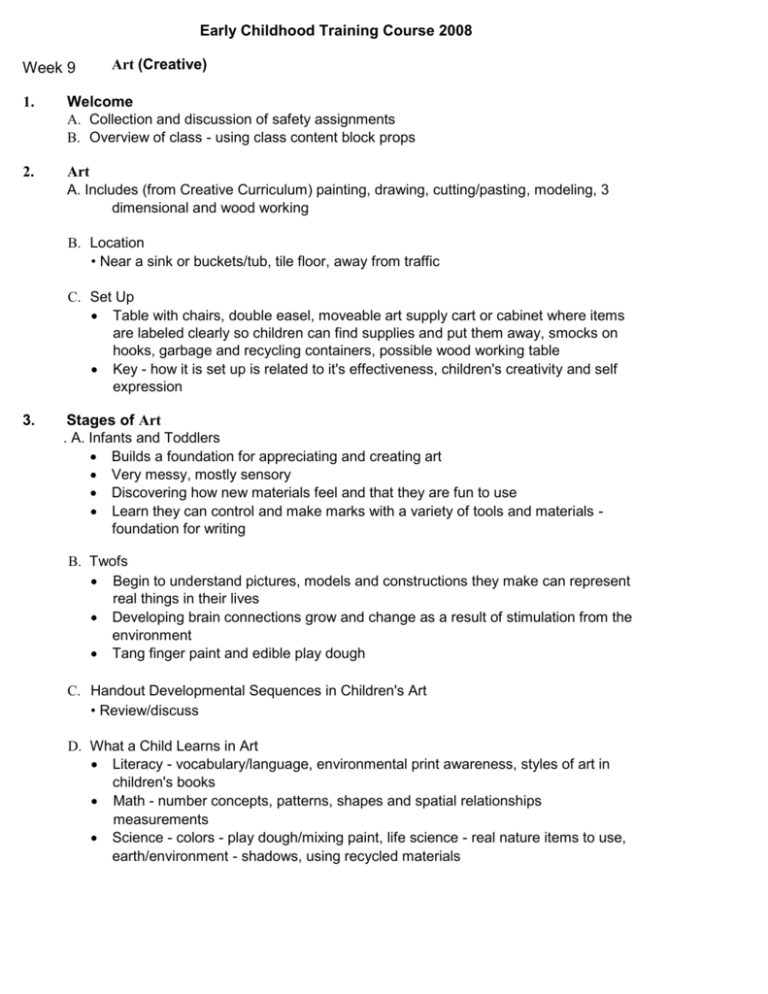
Early Childhood Training Course 2008 Week 9 Art (Creative) 1. Welcome A. Collection and discussion of safety assignments B. Overview of class - using class content block props 2. Art A. Includes (from Creative Curriculum) painting, drawing, cutting/pasting, modeling, 3 dimensional and wood working B. Location • Near a sink or buckets/tub, tile floor, away from traffic C. Set Up Table with chairs, double easel, moveable art supply cart or cabinet where items are labeled clearly so children can find supplies and put them away, smocks on hooks, garbage and recycling containers, possible wood working table Key - how it is set up is related to it's effectiveness, children's creativity and self expression 3. Stages of Art . A. Infants and Toddlers Builds a foundation for appreciating and creating art Very messy, mostly sensory Discovering how new materials feel and that they are fun to use Learn they can control and make marks with a variety of tools and materials foundation for writing B. Twofs Begin to understand pictures, models and constructions they make can represent real things in their lives Developing brain connections grow and change as a result of stimulation from the environment Tang finger paint and edible play dough C. Handout Developmental Sequences in Children's Art • Review/discuss D. What a Child Learns in Art Literacy - vocabulary/language, environmental print awareness, styles of art in children's books Math - number concepts, patterns, shapes and spatial relationships measurements Science - colors - play dough/mixing paint, life science - real nature items to use, earth/environment - shadows, using recycled materials C. Name If you write child!s name make sure it is spelled correctly and written with capital first letter then lower case - check spelling with teachers If child writes! they can use their name strip to copy from You can print their name and have them trace over it Child can write name themselves and if not correct! write it on back D. What to Say Talk about what child is doing and how they are doing it - "I see you are pounding the play dough with the palm of your hand,u "I see you are painting small circles with a big brush!! Use words to support and encourage - "you painted a lot of pictures today/! "I saw you being careful spreading the glue on the triangles you glued to the squares'! Ask questions that are open ended and encourage children to think and respond "what are some ways we could use these scrapes of fabricff Encourage/facilitate children sharing materials! waiting their turn for easel (write names down then go get them) Activity: p. 254 Creative Curriculum for Infants! Toddlers and 2!s - "Using your fingers to spread paintff Show a picture of a flower ask everyone to copy is using paper and crayons. Be critical of their efforts! telling a few theirs is beautiful and other!s that it doesnt look like the picture and they should try harder. Discuss how they felt about themselves during that activity! how they felt about me! how they felt about their abilities to create art! how they felt when they were complimented or criticized. How would you feel about art? Would you want you preschool child to feel that way about art? 6. Setting Up A. Getting Started Cover table with newspaper for painting! gluing! making structures Have marker for writing names If children will write name, have strips on table Using easel - make sure surface is covered and marker is there to write names If messy, make sure smock are close and available Check where "wetff collages and other art work are to be placed to dry Many rooms have a flat drying rack for those art projects If using cupboard tops for drying, be sure to cover with newspaper B. Materials Non toxic materials and non choke able items only Enough for number of children Variety of materials What is in art area is meant to be used, ask teacher for additional if needed Crayon and marker caddies for writing names, drawing as needed Page 3 Ask teachers about what glue they use - small bottles, large - poured into small cups with glue spreaders or fingers Small containers or trays for collage materials Use spoons to dish finger paint into small containers May need to demonstrate how to wipe brushes on side containers, squeeze a glue bottle, etc. If using glitter, always do it over newspaper on table and a plate under object and "dump" unstuck glitter onto plate - ask teachers about using glitter C. Easel Ask teachers what they put paint in- many use plastic cups with matching lids and brushes that match color paint Ask teachers what paper to use - many have large sheets or special papers Check where paint rack is so when children are done, you'll know When work/play is over, return paint to where it came from and clean brushes D. Clean Up Involve children as much as possible Wearing smocks, children can wash brushes - demonstrate first Return glue containers to bins, scraps in recycling, materials to a place for later, crayon and marker caddies to writing center Involve children to gather up and throw newspaper away, etc. Wash tables/sanitize Praise clean up efforts Activity: set up stations: painting to music, making a collage, making play dough, participate in as many as possible in allotted time, discuss what were the learning goals of each activity. Assignment: participate in leading an art activity and write it up on the form, having the teacher sign off on it. Song: Mary Wore a Red Dress Page 4 C. Recourses for Week 9 1. MN Early Childhood Indicators of Progress Domain III: Language Development and Communication p.34-35 Domain IV: Creativity and the Arts p.36-41 2. MN Core Competencies Content Area II: Learning Environment and Curriculum Promoting Personal and Social Development p.11 Promoting the Arts p.12 3. Creative Curriculum for Preschoolers Art p.317-335, 337-348 4. A Trainer's Guide to Creative Curriculum for Infants, Toddlers and Two's Part III: Workshops on Experiences Creating with Art p.249-259 Handout IF: Objectives #9, #21 5. A Trainers Guide to the Creative Curriculum for Preschool' Part II: Workshops for Interest Areas Art p.227-240 Page 5
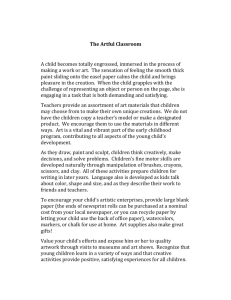
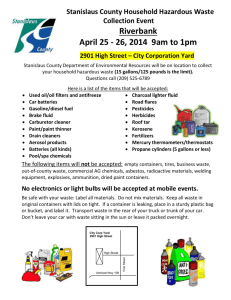
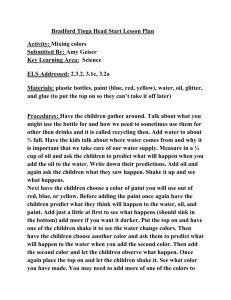
![[Agency] recognizes the hazards of lead](http://s3.studylib.net/store/data/007301017_1-adfa0391c2b089b3fd379ee34c4ce940-300x300.png)
